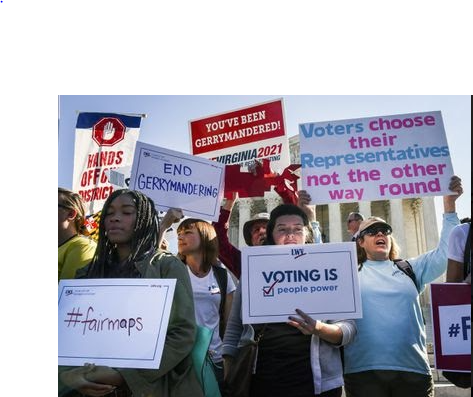“As early as the middle of the seventeenth century, the government of Virginia was a government of the tobacco planters, by the tobacco planters, and for the tobacco planters. Restrictions on the suffrage and distribution of representative seats secured their political dominance,” writes historian Brent Tarter in his 2019 book, Gerrymanders.
From the first gerrymandered map drawn by Governor Patrick Henry in 1788 to two hundred years later, this manipulation of electoral district boundaries with the intention of unfairly benefitting a certain political party—or otherwise called gerrymandering—is a practice that plagues Virginia politics.
Redistricting power in the state is granted to the party in control of the General Assembly, a unique characteristic of the Virginia Constitution that both Democrats and Republicans have exploited to leverage their power over the past decades.
According to the C-Ville Weekly, “gerrymandering takes on many forms. Isolated urban area districts can be buried within miles of the rural countryside. In 2018, the metro area Charlottesville-Albemarle voted for the democratic congressional candidate by a 70.4 to 29.6 margin but wound up with a republican representative.”
The newspaper goes on to mention that “voters of similar demographics can also be lumped into one district, concentrating their votes in a single seat and limiting their influence in a larger region. That practice is known as “racial gerrymandering” and has historically been used to disenfranchise Black voters in the commonwealth.”
In June 2018, a federal court ruled that Virginia’s House of Delegates “unconstitutionally packed African-American voters into 11 legislative districts” and “prioritized race” during the 2011 redistricting process according to the Richmond Times-Dispatch.
However, Amendment I offered an opportunity to the voters of the state in the November 2020 general election to combat the centuries-old practice of gerrymandering. The legislation aimed to amend the Virginia Constitution to establish a 16-member bipartisan redistricting commission composed of both citizens and legislators.
“Amendment I provides a solution by creating a bipartisan commission to be responsible for drawing electoral maps in Virginia. Most importantly, this commission will be led by citizens. It will require full transparency of all meetings and would prohibit partisan factions from gerrymandering. At long last, Virginia’s unfair redistricting laws would become relics of the past,” said Brian Cannon, former executive director of OneVirginia2021 and current head of FairMapsVa. Cannon and these organizations have spent more than five years working full-time to bring this amendment to life.
Due to restrictions laid by the Virginia Constitution, an amendment must pass through two separate legislative sessions before landing on the voter ballot.
During the previous legislative session, the amendment passed with overwhelming support from both parties, 85-13 in the House and 40-0 in the Senate, according to the New York Times. However, when Democrats gained control of the General Assembly following the 2019 elections, many reversed their positions and a few members even actively campaigned against the amendment. The official Democratic Party of Virginia, Arlington Democrats, and the NAACP of Virginia all came out against the amendment.
“One side wants to exercise raw political power,” said Republican Del. Jason Miyares of Virginia Beach about the Democrats. “It’s the hardest thing in the world to ask politicians to give up political power.”
Marcus Simon, a Democrat from Fairfax who has been working to defeat the referendum, disagrees. According to AP News, “Simon said the proposal still leaves legislators far too involved in the process of choosing the voters who will be in their districts. He said adding eight citizens to a panel doesn’t really do anything to boost citizen involvement when the citizens are selected from a list compiled by legislative leaders.” Simon added that while the issue can be seen as one of partisan greed, it is instead an issue of good governance. “Now that Democrats are in charge we want to do it the right way,” he said.
Delegate Carroll Fay, member of the House Legislative Black Caucus, said in an interview with the C-Ville Weekly, “Many people who support this redistricting amendment, they’ll get up and tell you that it’s not good, that it’s good enough, that it’s the best we can do right now.’ When you have something like the Virginia Constitution—our most sacred document, our foundational document—do you really put substandard amendments in the constitution? Because once you put it in, it’s almost impossible to get it out.”
Other members of the Black Caucus have also expressed concerns that the amendment doesn’t do enough to prevent racial gerrymandering.
In response to the Democrats’ reservations, Cannon wrote in a Richmond Times Dispatch column, “Some like to claim that the amendment should be rejected to make way for a perfect replacement plan sometime down the road. But here’s the problem: This requires a blind trust in politicians who have benefitted from this broken system for too long. Which would you rather trust: a legally-binding constitutional amendment or a pinky promise by politicians in power?”
Delegate Sally Hudson of Charlottesville was one of the nine House Democrats who broke away in support of the amendment. According to the C-Ville Weekly, she disagrees with Foy’s reverence for the Virginia Constitution. “The constitution is a constant work in progress,” she says. “It has always been a practical document that represents the best [the legislature] could get done. It’s always been loaded with frustrating compromise. That lowers the stakes a little and helps us think strategically.”
Despite the sharp split between Democrats, however, the amendment still passed through the General Assembly and was voted into law by Virginia voters in the November 2020 election.

